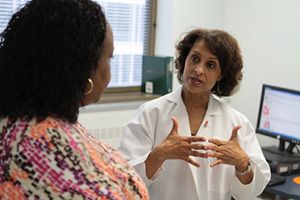February is American Heart Month and Go Red for Women®, the American Heart Association’s national movement to end heart disease and stroke in women. Heart disease doesn’t discriminate based on gender. Statistics show one in three women will die from cardiovascular disease, according to the American Heart Association. According to new research, unfortunately, heart attacks are increasingly occurring in younger people, especially women. Let’s make moves together to protect our heart health.
What you can do

Leading Cardiologist and Director of the GW Women’s Heart Health Center, Director of Noninvasive Cardiology and Professor of Medicine at GW School of Medicine, Jannet Lewis, MD, is passionate about women’s heart health and the need for women to advocate for themselves and pay attention to their heart health and overall wellness. Often, women tend to think of themselves in terms of breast health and gynecological health and rarely think about their heart.
Studies show women having heart attacks wait more than 30% longer than men from the moment they begin experiencing symptoms to the time they arrive at the hospital and once there, experience a 20% longer wait time than men.
A heart attack can be characterized by:
- Chest pain, often a dull heaviness in the chest
- Any pain in the upper part of the body, including the arms, the neck, the jaw, the upper abdomen and sometimes the back may be signs
- Nausea
- Profound fatigue
- Shortness of breath or lightheadedness
- Not the typical chest heaviness radiating down the left arm that men typically have
If you think you are having a heart attack but not sure, Call 911 right away and say ‘I am having a heart attack,’ as you seek help with the EMS and ER team. If you say things like I feel short of breath, or feeling nauseated – it may be harder to be heard and get the help you need. The outcome after a heart attack is directly related to how quickly you get to the hospital. Having access to a hospital with a team approach to managing a heart attack is very important. GW University Hospital has a very refined mechanism in place to move patients quickly to the cath lab to open blocked vessels that cause a heart attack.
Life’s Simple 7® - 7 Risk Factors that you can improve through lifestyle changes to help your heart
Tools such as the American Heart Association’s Life’s Simple 7, which focuses on lifestyle changes to improve your heart heath, are really important for women – even modest changes can lower your risk by as much as 80%.



